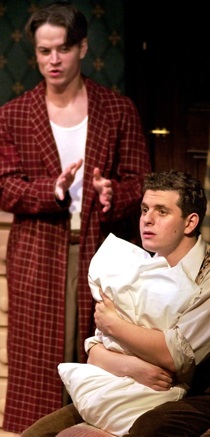Brighton
Beach Memoirs Geva Theatre Center, 2003
Herbert M. Simpson - City Paper
Neil Simon’s 1983 Brighton Beach Memoirs is an
immensely pleasing balancing act. Our most popular playwright’s first major drama of serious
autobiographical content, it deepens Simon's previous 22 years of hit gag-fests, yet more than equals
their charm and humor. In these memoirs of the summer when Simon’s extended family shared a beach
bungalow, we get a few changed facts and some slightly prettied-up realities, but a touchingly honest
reflection of both family conflicts and enduring values and affections.
Geva Theatre Center’s spiffy new production is beautifully cast and tightly
directed by Tim Ocel to preserve the comedy's balance of touching reality and hilarious wit, without a
single false note.
Our narrator is Eugene Morris Jerome, almost 15, in love with baseball and
with his 16 1/2-year-old cousin, Nora. He dreams of becoming a writer. It is 1937, a few years before
the actual period when Simon and his family lived in Brighton Beach in the house of his aunt and uncle
and their two daughters. In Memoirs, Simon makes the aunt a widow who
lives with her daughters inthe Jerome family’s house.
Eugene’s cranky mother holds the crowded household together. His loving
father anchors all the family’s turmoil with dependable support and wisdom. But the effects of the
Great Depression make it tough for this hard-up, hard-working, Jewish family to take care of themselves,
much less the relatives they pray will escape the war brewing in Europe and come to them for shelter.
Still, from the point of view of our teenager, the dominant concerns are the Yankees, avoiding an unfair
share of household chores, and sexual awakenings.
Everything in this perceptive comedy is realistically specific in time and
place, but free of any barriers to our understanding and appreciation. The production is nicely judged.
Erhard Rom’s big, exquisitely detailed set recreates a much lived-in dwelling that informs us about the
people and their era. B. Modern's costumes are appropriate enough to help the actors inhabit their
characters. Kendall Smith’s subtle, but complex, lighting unobtrusively underscores the play’s moods
and meanings.
The whole cast is admirable. Young Eugene is really the toughest role.
Never played by a near-15-year-old, the boy must seem unaware of his own wit, hold our concern, guide
our perspective, and seem all the while to be foolishly funny and boyish. Dennis Staroselsky does well
with all those tasks. After good subsequent stage and film performances, I’ve come to realize that the
extraordinary presence and magnetism Matthew Broderick originally brought to Eugene were Broderick’s
unique qualities, and not inherent in the role.
Mitchell Greenberg brings a remarkable, understated authority and decency to
the idealized father (the real father deserted the family whenSimon was 14), in effect portraying the
father Simon wished he had. Lori Wilner is wonderfully persuasive as Kate, the ultimate Jewish mother,
managing to avoid stereotype and be annoyingly nagging without once making us dislike her.
Barbara Sims brings rich detail to Kate's edgy sister, Blanche. Ocel
continues the tradition of casting Blanche as a glamorous, decidedly un-jewish-looking blonde (though
she’s never so described in the script). Bryant Richards gets impressive comedy and anguish in the
slightly underwritten role of Eugene’s brother, Stanley. And in fairly typical roles
(attention-needing, lovely teenager and spoiled brat younger sister, respectively), Dana Powers Acheson
and Kathleen Burke are fine—though Ms. Burke could use work on vocal projection. Simon went on to write
richer, more challenging dramas, but in Brighton Beach Memoirs, he created
a perennial favorite by looking back on the formative joys and troubles of his youth with affection and
compassion. Ocel’s revival keeps those values intact.

Bryant Richard / Dennis Staroselski
Brighton Beach Memoirs
Simon
Geva Theatre Center
2003
Photo: Ken Huth

